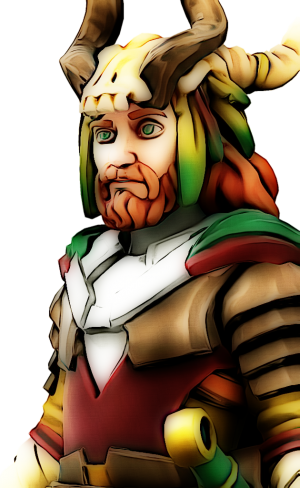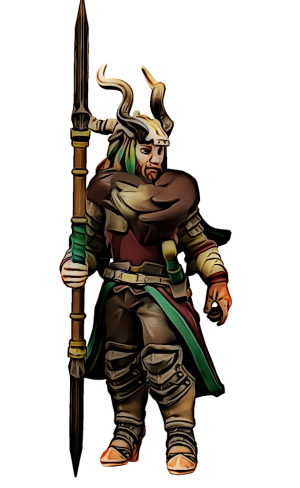Difference between revisions of "Loki"
(Created page with "{{Infobox god | title = Loki | image = Loki.jpg | caption = Loki, God of Mischief | native_title = | type = God...") |
|||
| (7 intermediate revisions by the same user not shown) | |||
| Line 1: | Line 1: | ||
{{Infobox god | {{Infobox god | ||
| title = Loki | | title = Loki | ||
| − | | image = Loki. | + | | image = Loki.png |
| caption = Loki, God of Mischief | | caption = Loki, God of Mischief | ||
| native_title = | | native_title = | ||
| Line 10: | Line 10: | ||
| other_names = | | other_names = | ||
| symbols = | | symbols = | ||
| − | | related_to = [[Woden]] (father-adoptive), [[Frigg]] (mother-adoptive) | + | | related_to = [[Woden]] (father-adoptive), [[Frigg]] (mother-adoptive), [[Hel]] daughter), [[Jormungandr]] (son), [[Fenris]] (son) |
}} | }} | ||
| − | [[Loki]] is | + | [[Loki]] is a constant nuisance and at the same time, boon to the other gods. [[Loki]] lives for mischief and only occasionally knows how his mischief will turn out. Often his mischief works to the benefit of the gods, where it has led to the creation of [[Woden]]'s horse, Thor's hammer ([[Mjolnir]]) and even the walls of [[Asgard]] itself. |
==Depictions== | ==Depictions== | ||
| + | [[File:LokiPose.png|left|300px]] | ||
| + | Depictions of [[Loki]] are on [[Otan]] are divided by two phases of [[Loki]]'s fabled life. When not shape-shifted into a bear, horse or salmon, he is depicted as a young and exceptionally tall man, clad in fur and sometimes wearing a horned helm. He is also depicted as an old disheveled man bound by entrails with a venom dripping serpent over his head. The latter depiction refers to his imprisonment which leads up to [[Ragnarok]]. | ||
==Lore== | ==Lore== | ||
| + | There are dozens of legends concerning [[Loki]] which generally can be rounded down to a formula. First, [[Loki]] concocts a scheme which will either benefit or possibly harm the other gods. We get a sense that [[Loki]] does not care which. [[Thor]] then steps in to announce that if [[Loki]]'s scheme goes awry, that he will kill Loki with his hammer. Lastly, [[Loki]] does something unexpected and the scheme works out, everyone profits and Loki is forgiven. | ||
| + | |||
| + | One thread, however does not work out well for [[Loki]]. One of his less playful schemes resulted in the death of the god [[Baeldaeg]], who was permanently sentenced to [[Helheim]] as a result of even more of Loki's trikery. [[Baeldaeg]] was the son of [[Woden]] and [[Frigg]] and much beloved by all gods and living creatures on [[Otan]] alike. His death was the end of [[Loki]] as for revenge, [[Loki]] was eternally bound in a cave by the entrails of his own son. The legend sees him free himself from his bonds during [[Ragnarok]], but he does not survive. Spoiler alert: nothing survives. | ||
==Intercession== | ==Intercession== | ||
| + | [[Loki]] is very unlikely to interfere directly with human affairs, but will grant powers to his faithful who are able to tune religious magic. [[Loki]] is much more likely to reward his followers who add a little chaos to the world. He greatly appreciates practical jokes and in his own divine augurs and answers to prayer, it would not be unlikely for a penitent to find themselves the brunt of a practical joke. | ||
| + | |||
| + | Unlike the jokes of other "trickster" gods, [[Loki]]'s jokes may have fatal consequences. The penitent who survive or overcome a Divine practical joke are often greatly rewarded for their patience and faith in (and understanding of) [[Loki]]. Even the gods themselves who have survived the brunt of [[Loki]]'s japes have often found themselves much richer for the wear. | ||
===Creations=== | ===Creations=== | ||
| + | [[Loki]]'s greatest creations (and most ominous) are his children: [[Sleipnir]] (Woden's 8-legged horse and a long story), [[Hel]]; the goddess of [[Helheim]], [[Jormungandr]]; the world-snake, and [[Fenris]]; a gargantuan wolf. | ||
===Commandments=== | ===Commandments=== | ||
===Notes for 5e Spellcasters=== | ===Notes for 5e Spellcasters=== | ||
| − | + | Like [[Loki]] himself, Loki's followers are likely to teach the ways of [[Loki]] to others through practical jokes or other japes. | |
{{Copyright notice}} | {{Copyright notice}} | ||
Latest revision as of 15:30, 26 February 2022
| Type | God |
|---|---|
| Religion | Wodenism |
| God of | Mischief |
| Home | Valhalla |
| Related To | Woden (father-adoptive), Frigg (mother-adoptive), Hel daughter), Jormungandr (son), Fenris (son) |
Loki is a constant nuisance and at the same time, boon to the other gods. Loki lives for mischief and only occasionally knows how his mischief will turn out. Often his mischief works to the benefit of the gods, where it has led to the creation of Woden's horse, Thor's hammer (Mjolnir) and even the walls of Asgard itself.
Depictions[edit]
Depictions of Loki are on Otan are divided by two phases of Loki's fabled life. When not shape-shifted into a bear, horse or salmon, he is depicted as a young and exceptionally tall man, clad in fur and sometimes wearing a horned helm. He is also depicted as an old disheveled man bound by entrails with a venom dripping serpent over his head. The latter depiction refers to his imprisonment which leads up to Ragnarok.
Lore[edit]
There are dozens of legends concerning Loki which generally can be rounded down to a formula. First, Loki concocts a scheme which will either benefit or possibly harm the other gods. We get a sense that Loki does not care which. Thor then steps in to announce that if Loki's scheme goes awry, that he will kill Loki with his hammer. Lastly, Loki does something unexpected and the scheme works out, everyone profits and Loki is forgiven.
One thread, however does not work out well for Loki. One of his less playful schemes resulted in the death of the god Baeldaeg, who was permanently sentenced to Helheim as a result of even more of Loki's trikery. Baeldaeg was the son of Woden and Frigg and much beloved by all gods and living creatures on Otan alike. His death was the end of Loki as for revenge, Loki was eternally bound in a cave by the entrails of his own son. The legend sees him free himself from his bonds during Ragnarok, but he does not survive. Spoiler alert: nothing survives.
Intercession[edit]
Loki is very unlikely to interfere directly with human affairs, but will grant powers to his faithful who are able to tune religious magic. Loki is much more likely to reward his followers who add a little chaos to the world. He greatly appreciates practical jokes and in his own divine augurs and answers to prayer, it would not be unlikely for a penitent to find themselves the brunt of a practical joke.
Unlike the jokes of other "trickster" gods, Loki's jokes may have fatal consequences. The penitent who survive or overcome a Divine practical joke are often greatly rewarded for their patience and faith in (and understanding of) Loki. Even the gods themselves who have survived the brunt of Loki's japes have often found themselves much richer for the wear.
Creations[edit]
Loki's greatest creations (and most ominous) are his children: Sleipnir (Woden's 8-legged horse and a long story), Hel; the goddess of Helheim, Jormungandr; the world-snake, and Fenris; a gargantuan wolf.
Commandments[edit]
Notes for 5e Spellcasters[edit]
Like Loki himself, Loki's followers are likely to teach the ways of Loki to others through practical jokes or other japes.
| Copyright © 2021-2024 by Robyn Blaber and Will to Power Games. All rights reserved. Content on this website may not be reproduced without written permission of the copyright owner. |

